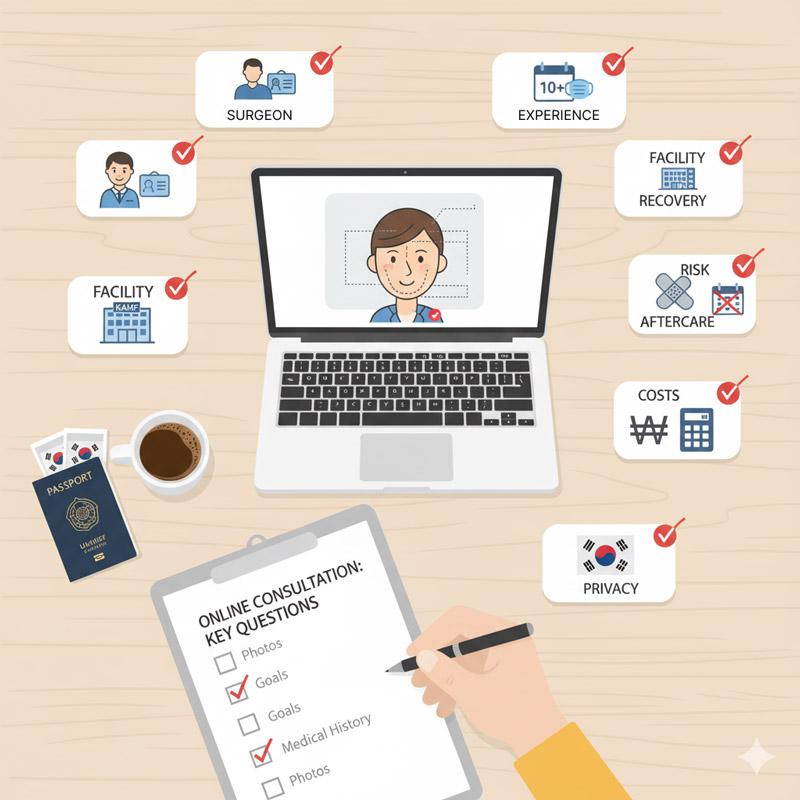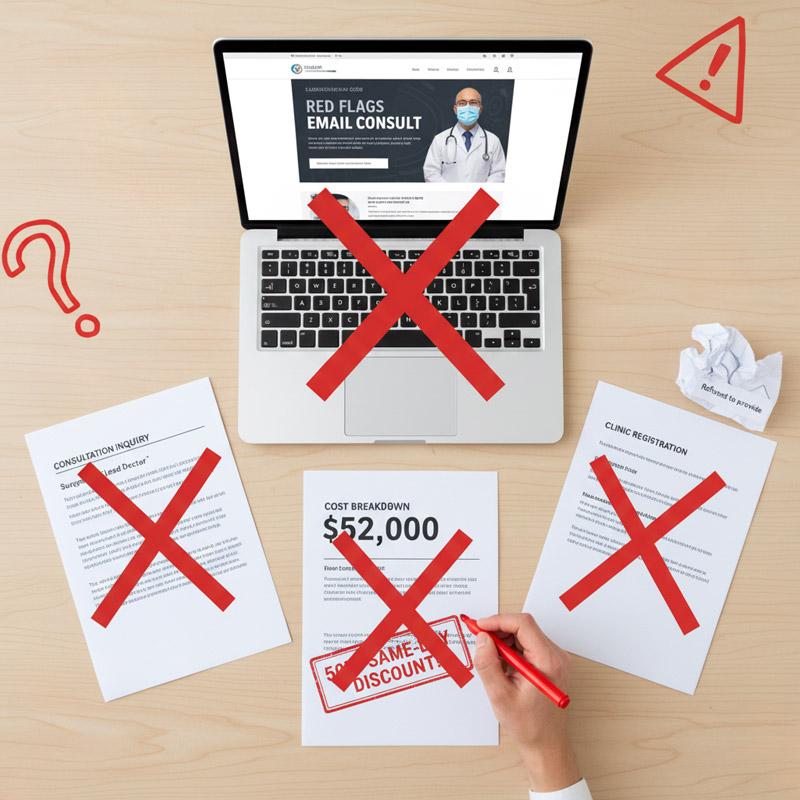Medical Tourism Blog
What Questions Should Foreigners Ask During an Online Consultation Before Plastic Surgery in Korea? (2025 Guide)

Table of contents
- How to prepare your email (before hitting send)
- What to Ask in Your Online Consultation
- Email templates (Copy‑paste email skeleton)
- Red flags in an email consult
Considering treatment in Korea? Everything you need to know e.g. — how to avoid scams, visas, interpreters, recovery tips — in our Medical Tourism Master Guide. Plan with confidence in minutes, not weeks!
For international patients planning surgery in Korea. Use this as a checklist for your email consultation.
For international patients, an online consultation is the first and most important step in planning surgery abroad. It’s your chance to ask questions, understand your options, and decide whether a clinic is trustworthy. A good consultation should feel transparent, detailed, and personalized—not rushed or vague.
Use the prompts below to confirm who operates on you, how the clinic manages safety/aftercare, and what the real costs and timelines look like.
How to prepare your email (before hitting send)
- Write your top 3 goals and deal‑breakers in plain text at the top of the email.
- Attach front/side/oblique photos in good light (no filters).
- Include medical history & meds (allergies, prior surgeries, smoking/nicotine, isotretinoin, anticoagulants).
- State your travel window (arrival/departure), available downtime, and must‑return date.
- Add your preferred language for documents (e.g., English) and your time zone.
Photo checklist for email
- Neutral background, hair pulled back, no makeup; shoulders relaxed.
- Angles: front (neutral), 45° both sides, profile both sides; close‑ups if relevant.
- Image size: 1–3 MB each; avoid HEIC if possible (use JPG/PNG).
What to Ask in Your Online Consultation

(Keep the numbered headings below in your email. Ask the clinic to reply under each one.)
1) Who will perform my surgery? Will they be present start‑to‑finish?
Ask for: full legal name and board specialty of the operating surgeon; confirmation they will be present from incision to closure. Some clinics showcase senior doctors in marketing, but assign surgeries to junior or different surgeons.
Good answer: Surgeon is named on consult and will be named on consent; no “switching” on the day; you will meet them again pre‑op.
2) What is the surgeon’s experience with my exact case?
Ask for: years in practice, annual case volume, and before‑and‑after photos of similar patients (age/ethnicity/anatomy).
Good answer: Specific numbers, comparable B&A sets, and candor about limitations/risks.
3) Am I a suitable candidate? What are the alternatives?
Ask for: pros/cons of each option (surgical vs. nonsurgical), and why the recommended plan fits your anatomy and goals.
Good answer: A custom plan with techniques named (e.g., deep plane vs. SMAS plication; rib vs. septal graft), plus what not to do.
4) What exactly will you do? (your operative plan)
Ask for: incision locations, implant/brand if relevant, devices/energy platforms, estimated OR time, and whether assistants participate.
Good answer: Clear step list; device/implant sourcing; role of assistants; plan for common intra‑op decisions (e.g., asymmetry).
5) Anesthesia & safety
Ask for: anesthesia type; who provides and monitors it (board‑certified anesthesiologist vs. nurse/CRNA); monitoring standards; emergency equipment.
Good answer: Named anesthesia provider, standard monitors, airway plan, and a route for emergency transfer.
6) Facility credentials
Ask for: confirmation the clinic is registered to treat foreign patients and any safety accreditations (e.g., KAHF). Request the registration number.
Good answer: Verifiable registration and a willingness to share documents upon request.
7) Risks, complications & revision policy
Ask for: most likely complications for your case, expected rates, how they’re managed, and what revisions cost.
Good answer: Realistic complication discussion; written policy for revisions; examples of how complications are triaged and treated.
8) Recovery & downtime
Ask for: pain, bruising, swelling timeline; return‑to‑work date; activity restrictions; when you can fly home.
Good answer: A day‑by‑day outline with milestones and red‑flag symptoms.
If you’d like to get a sense of what to expect during the recovery process, Read Here
9) Aftercare & remote support
Ask for: number/timing of follow‑ups; how to reach the team after you return home (email/telehealth); 24/7 emergency contact.
Good answer: A written aftercare schedule, names/roles, and a dedicated remote channel.
10) Medical records in English
Ask for: translated consent, op note/discharge summary, implant stickers/lot numbers, medication list, and clinic contact for your local doctor.
Good answer: They provide English documents routinely at no extra charge (or clearly state the fee).
11) Transparent cost breakdown (in KRW)
Ask for: written, itemized quote covering surgeon, anesthesia, facility/OR, implants/devices, meds/garments, follow‑ups, and possible extras. Clarify tax/VAT, any card surcharge, and refund rules.
Good answer: A single KRW estimate with inclusions/exclusions, validity period, and “what‑if” scenarios (longer OR time, add‑ons).
12) Scheduling & time in Korea
Ask for: minimum days in Seoul, pre‑op testing timing, and the cooling‑off period between consult and surgery (if any).
Good answer: A realistic itinerary (pre‑op day 1, surgery day 2, follow‑ups day 3/7, etc.).
13) Language & coordination
Ask for: availability of a bilingual coordinator/interpreter, and whether contracts, consents, and instructions are in your language.
Good answer: Named coordinator; translations supplied; no pressure to sign untranslated documents.
14) Photos, marketing & privacy
Ask for: how your photos may be used; consent for marketing; ability to opt‑out; where images are stored.
Good answer: Opt‑in only; secure storage; no posting without signed permission.
15) Second opinions
Ask for: time to consider; whether they support you seeking a second opinion
Good answer: Encourages careful decision‑making; no pressure tactics; quote remains valid for a reasonable window.
Email templates (Copy‑paste email skeleton)
Subject: Initial email consultation – [Procedure] – [Your Name] – [Target Date Window]
1) Goals & concerns
- [Your top 3 goals]
- [Any specific concerns/asymmetries]
2) Photos attached
- Front / 45° / profile L&R / close‑ups (no filters)
3) Medical history & meds
- Allergies:
- Prior surgeries:
- Medications/supplements (incl. nicotine):
4) Travel window & downtime
- Arrival/Departure:
- Must‑return date:
- Downtime available:
5) Please reply inline to these (short answers fine):
- Operating surgeon (full name/board specialty; present start‑to‑finish?)
- Experience with my case (years, case volume; B&A of similar cases)
- Candidacy & alternatives (why this plan vs. others)
- Operative plan (incisions/devices/OR time/assistant role)
- Anesthesia & safety (provider, monitoring, emergency plan)
- Facility credentials (foreign‑patient registration no.; any accreditations)
- Risks & revisions (top risks, revision policy/costs)
- Recovery timeline (pain/bruising/swelling, RTW, flying home)
- Aftercare & remote support (follow‑ups, 24/7 contact, telehealth)
- English medical records (consent, op note, discharge, lot/serial)
- Itemized KRW quote (surgeon, anesthesia, facility, devices, meds, follow‑ups, VAT, any card surcharge; possible extras)
- Schedule requirements (days in Seoul; pre‑op tests)
- Language support (coordinator/interpreter; translated documents)
- Privacy/marketing (photo use; opt‑in only?)
- Quote validity & second opinions (time to decide; pressure‑free)
Thank you! I prefer documents in [language]. Time zone: [e.g., Asia/Seoul].
Start Sending to Verified Clinics
Red flags in an email consult

- Vague about who operates; unwilling to put surgeon’s name on consent.
- No itemized costs; heavy same‑day discount pressure.
- No clear aftercare plan or English records.
- Avoids discussing risks/complications or revision policy.
- Refuses to confirm registration or to share accreditation details.
How to Spot a BAD Clinic – Full Checklist
Final note
Take your time. Share your photos and history honestly, ask for a custom plan, and get everything in writing (KRW). If anything feels rushed or unclear, seek a second opinion before you book.







